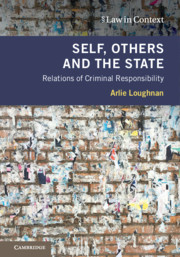Book contents
- Self, Others and the State
- The Law in Context Series
- Self, Others and the State
- Copyright page
- Dedication
- Contents
- Acknowledgements
- Table of Cases
- Table of Statutes
- Abbreviations
- Introduction
- Part I Rethinking Criminal Responsibility
- Part II Responsibility in Criminal Law
- 3 Modernisation through Form and Process
- 4 The ‘Birth’ of Australian Criminal Law
- 5 Peak Responsibility?
- Part III Criminal Responsibility in Relation
- Conclusion
- Bibliography
- Index
3 - Modernisation through Form and Process
Criminal Responsibility at the Turn of the Twentieth Century
from Part II - Responsibility in Criminal Law
Published online by Cambridge University Press: 11 November 2019
- Self, Others and the State
- The Law in Context Series
- Self, Others and the State
- Copyright page
- Dedication
- Contents
- Acknowledgements
- Table of Cases
- Table of Statutes
- Abbreviations
- Introduction
- Part I Rethinking Criminal Responsibility
- Part II Responsibility in Criminal Law
- 3 Modernisation through Form and Process
- 4 The ‘Birth’ of Australian Criminal Law
- 5 Peak Responsibility?
- Part III Criminal Responsibility in Relation
- Conclusion
- Bibliography
- Index
Summary
This chapter is focused on the turn of the twentieth century, which was a decisive moment in Australian criminal law. I make two main arguments. First, while there has been a tendency to associate the modernisation of the criminal law with codification, I argue that, in the Australian context, the practices of codification and consolidation were connected, as each was a response to common concerns with the need to modernise criminal law and criminal justice institutions. Second, I argue that, against a background of the early development of institutions of democratic governance, and amid concerns with the exercise of government power, the 1883 Act and the 1899 Code represent a commitment to modernisation founded on form – comprehensive legislation or a code – and process – the operation of criminal justice – as much as on principles of criminal responsibility. The significance of form and process accounts for the inclusion of detailed and extensive provisions relating to the administration of criminal justice, and criminal procedure and punishment, in both the Act and the Code. Across these two criminal law reforms, criminal responsibility was only one plank of the modernisation of the criminal law, sharing its weight with the form of the criminal law and the operation of criminal justice.
Keywords
- Type
- Chapter
- Information
- Self, Others and the StateRelations of Criminal Responsibility, pp. 75 - 103Publisher: Cambridge University PressPrint publication year: 2019



